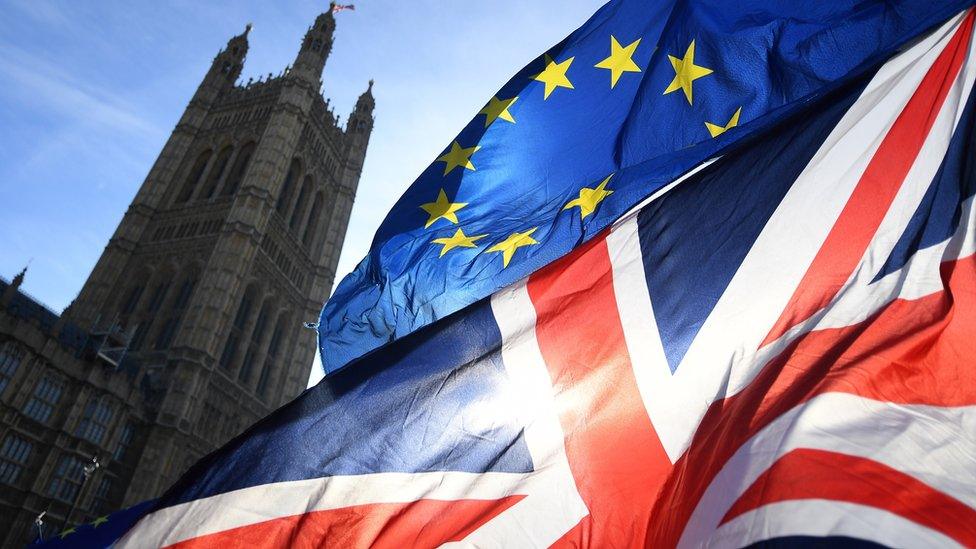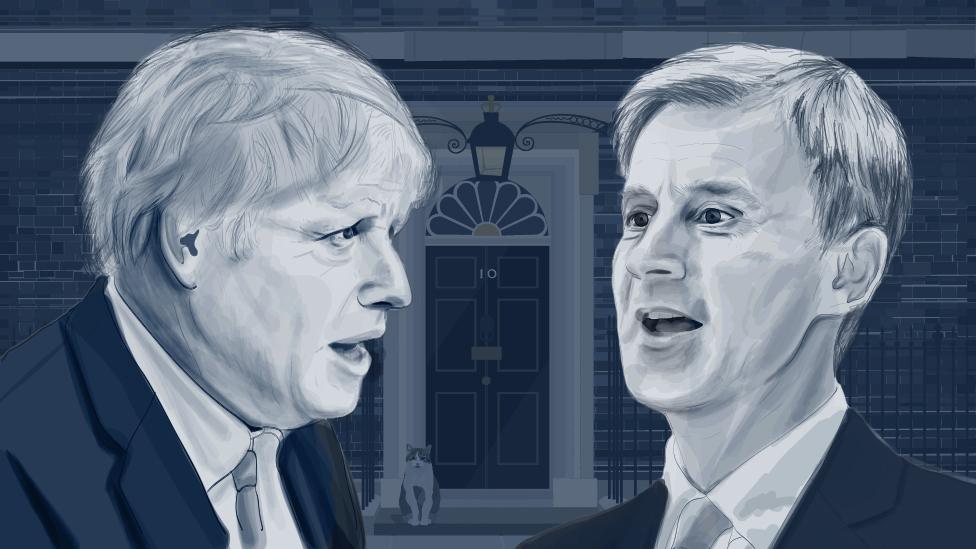Tory leadership: The constitutional crisis facing the next PM
- Published
- comments

It's hard to think of political circumstances less conducive to calm reflection and sober judgement than this Tory party leadership contest.
The party picking the UK's next prime minister is in turmoil.
It is spooked to its core by the Brexit Party's sudden surge and terrified of a general election, and the government limps along with no majority and little purpose.
Theresa May's single overriding objective was to ensure the UK left the EU in an orderly way with a withdrawal agreement in place at the end of March.
That original Brexit deadline has now been delayed twice at the UK's request and EU's consent, and the latest deadline - 31 October - has become a totemic date in the scrap for No 10.
It is in this maelstrom the government will soon decide how and when to leave the EU - a decision of huge economic and strategic consequence that is being whacked around like a shuttlecock between the leadership contenders.
Both Jeremy Hunt and Boris Johnson have claimed they can renegotiate the existing withdrawal deal with the EU and get it through Parliament in the next four months.
That is despite the EU's weary and unwavering insistence that the guts of the deal, including the Irish backstop, cannot be reopened.
Neither candidate has explained how they will succeed where Mrs May failed, apart from trumpeting their personal talents of charm and persuasion.
'Tough on readiness'
Leaving the EU without a deal remains the legal default at the end October - unless a withdrawal agreement is finally passed by Parliament or another extension is granted.
Revoking Article 50 is theoretically an option too, but toxic to Tories and won't happen.
Instead, both Mr Johnson and Mr Hunt are competing to sound tough on their readiness to leave without a deal.
Mr Johnson says the UK will leave on 31 October "do or die".
Mr Hunt says he could be a bit more flexible on the date, but would decide by the end of September whether to continue Brexit talks with Brussels or go for a no-deal option.
BBC political correspondent Chris Mason's guide to the political life of Boris Johnson
Neither of them pretends a no-deal Brexit would be a picnic, but their belligerence seems out of step with most voters.
One reason for that, of course, is that this is a contest being decided by 160,000 Tory party members.
Jeremy Hunt: Who is the Conservative leadership contender?
According to recent polling analysis, while only a quarter of the wider public support leaving the EU without a Brexit deal, around two-thirds of surveyed rank and file Tory members think the UK should, external.
Of those Tories backing Boris Johnson, a remarkable 85% are keen on a no-deal Brexit. That is the mood driving this leadership contest and shaping Brexit strategies that will soon be severely tested.
'Nails in their Brexit boxes'
Last month, Philip Hammond - the Chancellor for a little longer - warned Tory leadership contenders not to box themselves into a corner by pledging to take the UK out of the EU by the end of October.
But everyday, Mr Johnson and Mr Hunt hammer more rhetorical nails into their Brexit boxes.
Westminster and the EU will soon begin their summer slumber and time is running out.
The new prime minister will have only 100 days from entering No 10 to renegotiate a new deal and get it through Parliament.
MPs may well try and scupper a government intent on leaving the EU without a deal, but their procedural options look limited.
As it stands, the chance of a no-deal Brexit seems to be growing and the new prime minister could find themselves tackling a political and constitutional crisis this breezy Tory leadership contest shows little sign of presaging.
- Published13 December 2020

- Published18 July 2019
